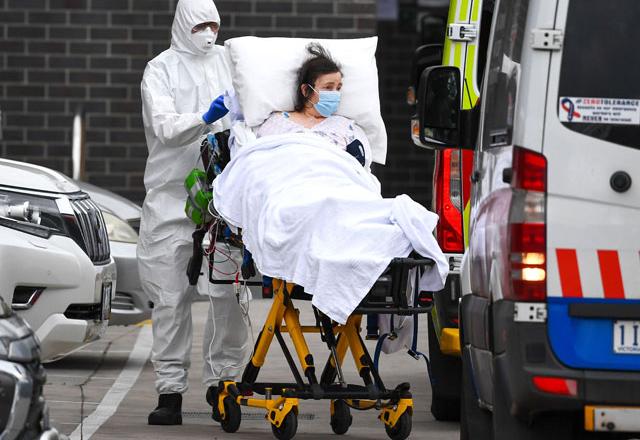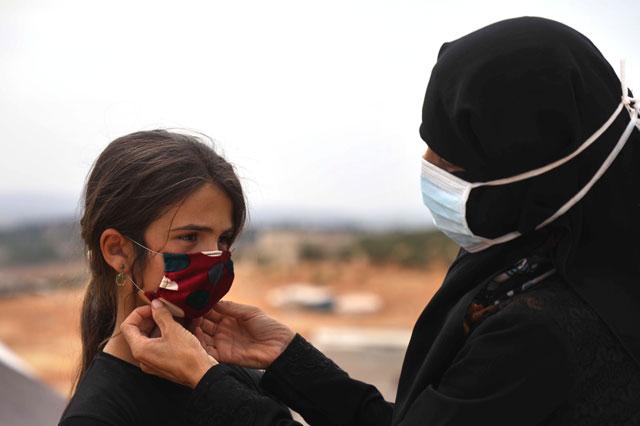You are here
Virus curbs tightened over fears of a second wave
By AFP - Jul 29,2020 - Last updated at Jul 29,2020

Ambulance officer transfers a resident from the Epping Gardens aged care facility in the Melbourne suburb of Epping on Tuesday as the city battles fresh outbreaks of the COVID-19 coronavirus (AFP photo)
PARIS — Governments across the world imposed new restrictions Tuesday in a bid to cool coronavirus hotspots as new infections shot up in some countries, sparking fears of a second wave.
The World Health Organization warned that the virus does not appear to be affected by seasonality and the global death toll from the pandemic passed 654,000 Tuesday, nearly a third of that number in Europe, according to an AFP tally.
More than 100,000 deaths have been recorded since July 9 and the global toll has doubled in just over two months.
Iran suffered its worst day yet of the pandemic, reporting 235 new deaths on Tuesday, a record toll for a single day in the Middle East's hardest-hit country.
"The situation is worrying," health ministry spokeswoman Sima Sadat Lari said.
"Tehran, the most populous province, has turned red for the first time since the first peak of the virus."
Authorities have made masks mandatory in enclosed public spaces and allowed the hardest-hit provinces, including Tehran, to reimpose restrictions that had been progressively lifted since April to reopen Iran's sanctions-hit economy.
China surge
Chinese authorities scrambled to halt the possibility of a second wave of infections after a new coronavirus cluster in the northwest port city of Dalian spread to other provinces.
China had largely brought the virus under control since it first emerged in the country late last year, through a series of strict lockdowns and travel restrictions.
But in recent months a number of small outbreaks have given cause for concern, with China reporting 68 new infections on Tuesday — the highest daily number since April.
Of those, 57 were in the northwest region of Xinjiang, where an outbreak has seen millions of residents tested and strict lockdowns in the regional capital Urumqi.
Health authorities said the Dalian cluster had now spread to nine cities in five regions across the country, including as far away as the southeast coastal province of Fujian.
Beijing has tightened measures in the affected region, introducing mass testing in Dalian and heightened scrutiny of travellers arriving in the city.
Meanwhile, southern China on Tuesday became the latest Chinese airline to offer ultra-cheap, all-you-can-fly deals aimed at reigniting air travel following lockdowns.
At least eight Chinese carriers have so far launched similar schemes which they hope will boost the ailing domestic aviation sector in the world’s second-largest economy.
Spanish quarantine
The UN World Tourism Organisation said Tuesday that the coronavirus crisis cost the global tourism sector $320 billion in lost revenue between January and May.
This is “more than three times the loss during the Global Financial Crisis of 2009”, the Madrid-based organisation said in a statement.
The summer season in Europe continues to pose problems for the sector and people wanting to go abroad on holiday.
Over the weekend, the United Kingdom introduced a mandatory 14-day quarantine for travellers returning from Spain which has seen an uptick in cases in recent weeks.
British Prime Minister Boris Johnson warned on Tuesday of a “second wave” in Europe.
“Let’s be absolutely clear about what’s happening in Europe, amongst some of our European friends, I’m afraid you are starting to see in some places the signs of a second wave of the pandemic.”
Spain’s tourism industry faced fresh misery as Germany also issued a travel warning against parts of the country.
Greece said on Tuesday it will reopen six of its ports, including Piraeus in Athens, to cruise ships at the weekend but made masks compulsory again in shops and public services in response to a recent rise in infections.
Summer isn’t safer
The World Health Organisation meanwhile warned against false beliefs that summer is safer and could slow the spread of the pandemic.
“Season does not seem to be affecting the transmission of this virus,” WHO spokeswoman Margaret Harris told reporters.
She said some of the hardest-hit countries are currently in the midst of different season.
While it is summer in the United States, which with nearly 148,000 deaths and close to 4.3 million cases is the hardest-hit country, the second most affected country Brazil, which counts more than 87,000 deaths, is in winter.
And yet, she said, there “seems to be this fixed idea about this virus being seasonal”, and that COVID-19 will come in waves.
This is “more than three times the loss during the Global Financial Crisis of 2009”, the Madrid-based organisation said in a statement.
Related Articles
PARIS — The world has set a new record for the highest daily increase in coronavirus infections, as a survey released Saturday showed govern
GENEVA — The World Health Organisation has warned there might never be a "silver bullet" for the coronavirus, as Australia's second-largest
PARIS — Recorded deaths from the coronavirus neared 650,000 on Monday as the disease surged back at hotspots in Asia, Europe and the America

















